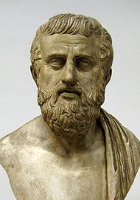Sophocles Biography
Sophocles (c. 497/6 BC- winter 407/6 BC)was the second of the three ancient Greek tragedians whose work has survived. His first plays were written later than those of Aeschylus and earlier than those of Euripides. According to the Suda, a 10th century encyclopedia, Sophocles wrote 123 plays during the course of his life, but only seven have survived in a complete form: Ajax, Antigone, Trachinian Women, Oedipus the King, Electra, Philoctetes and Oedipus at Colonus. For almost 50 years, Sophocles was the most-awarded playwright in the dramatic competitions of the city-state of Athens that took place during the religious festivals of the Lenaea and the Dionysia. Sophocles competed in around 30 competitions; he won perhaps 24 and never received lower than second place; in comparison, Aeschylus won 14 competitions and was defeated by Sophocles at times, while Euripides won only 4 competitions.
The most famous of Sophocles' tragedies are those concerning Oedipus and Antigone: these are often known as the Theban plays, although each play was actually a part of different tetralogy, the other members of which are now lost. Sophocles influenced the development of the drama, most importantly by adding a third actor and thereby reducing the importance of the chorus in the presentation of the plot. He also developed his characters to a greater extent than earlier playwrights such as Aeschylus
WHO, loving life, hath sought
To outrun the appointed span,
Shall be arraigned before my thought
...
What man is he that yearneth
For length unmeasured of days?
Folly mine eye discerneth
Encompassing all his ways.
...
O LOVE, thou art victor in fight: thou mak'st all things afraid;
Thou couchest thee softly at night on the cheeks of a maid;
...
A weary life is that the sailors lead,
To whom no gift from Heaven or Fortune sent
Could offer worthy recompense. Poor souls,
Adventuring traffic far on slender chance,
They save, or gain, or lose all utterly.
...
Soon will the clear-voiced flute return to you
With no unfitting strain,
But like a lyre with hymn
And song the Gods approve;
For, lo! the hero whom Zeus owns as son,
...
